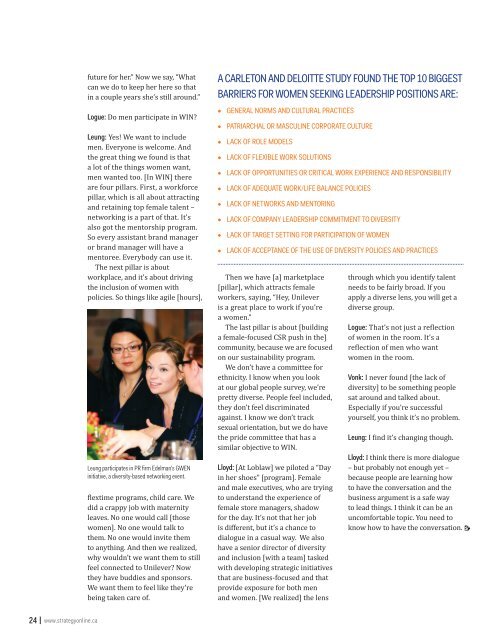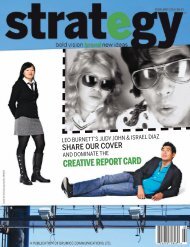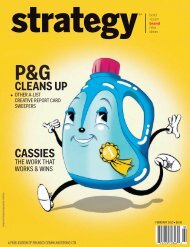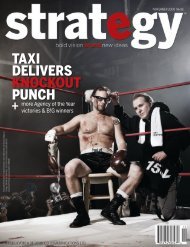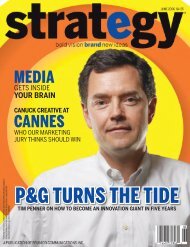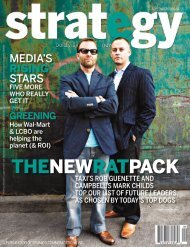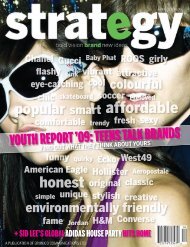download the PDF version - Strategy
download the PDF version - Strategy
download the PDF version - Strategy
Create successful ePaper yourself
Turn your PDF publications into a flip-book with our unique Google optimized e-Paper software.
future for her.” Now we say, “What<br />
can we do to keep her here so that<br />
in a couple years she’s still around.”<br />
Logue: Do men participate in WIN?<br />
Leung: Yes! We want to include<br />
men. Everyone is welcome. And<br />
<strong>the</strong> great thing we found is that<br />
a lot of <strong>the</strong> things women want,<br />
men wanted too. [In WIN] <strong>the</strong>re<br />
are four pillars. First, a workforce<br />
pillar, which is all about attracting<br />
and retaining top female talent –<br />
networking is a part of that. It’s<br />
also got <strong>the</strong> mentorship program.<br />
So every assistant brand manager<br />
or brand manager will have a<br />
mentoree. Everybody can use it.<br />
The next pillar is about<br />
workplace, and it’s about driving<br />
<strong>the</strong> inclusion of women with<br />
policies. So things like agile [hours],<br />
Leung participates in PR firm Edelman’s GWEN<br />
initiative, a diversity-based networking event.<br />
lextime programs, child care. We<br />
did a crappy job with maternity<br />
leaves. No one would call [those<br />
women]. No one would talk to<br />
<strong>the</strong>m. No one would invite <strong>the</strong>m<br />
to anything. And <strong>the</strong>n we realized,<br />
why wouldn’t we want <strong>the</strong>m to still<br />
feel connected to Unilever? Now<br />
<strong>the</strong>y have buddies and sponsors.<br />
We want <strong>the</strong>m to feel like <strong>the</strong>y’re<br />
being taken care of.<br />
A CARLETON AND DELOITTE STUDY FOUND THE TOP 10 BIGGEST<br />
BARRIERS FOR WOMEN SEEKING LEADERSHIP POSITIONS ARE:<br />
• GENERAL NORMS AND CULTURAL PRACTICES<br />
• PATRIARCHAL OR MASCULINE CORPORATE CULTURE<br />
• LACK OF ROLE MODELS<br />
• LACK OF FLEXIBLE WORK SOLUTIONS<br />
• LACK OF OPPORTUNITIES OR CRITICAL WORK EXPERIENCE AND RESPONSIBILITY<br />
• LACK OF ADEQUATE WORK/LIFE BALANCE POLICIES<br />
• LACK OF NETWORKS AND MENTORING<br />
• LACK OF COMPANY LEADERSHIP COMMITMENT TO DIVERSITY<br />
• LACK OF TARGET SETTING FOR PARTICIPATION OF WOMEN<br />
• LACK OF ACCEPTANCE OF THE USE OF DIVERSITY POLICIES AND PRACTICES<br />
Then we have [a] marketplace<br />
[pillar], which attracts female<br />
workers, saying, “Hey, Unilever<br />
is a great place to work if you’re<br />
a women.”<br />
The last pillar is about [building<br />
a female-focused CSR push in <strong>the</strong>]<br />
community, because we are focused<br />
on our sustainability program.<br />
We don’t have a committee for<br />
ethnicity. I know when you look<br />
at our global people survey, we’re<br />
pretty diverse. People feel included,<br />
<strong>the</strong>y don’t feel discriminated<br />
against. I know we don’t track<br />
sexual orientation, but we do have<br />
<strong>the</strong> pride committee that has a<br />
similar objective to WIN.<br />
Lloyd: [At Loblaw] we piloted a “Day<br />
in her shoes” [program]. Female<br />
and male executives, who are trying<br />
to understand <strong>the</strong> experience of<br />
female store managers, shadow<br />
for <strong>the</strong> day. It’s not that her job<br />
is different, but it’s a chance to<br />
dialogue in a casual way. We also<br />
have a senior director of diversity<br />
and inclusion [with a team] tasked<br />
with developing strategic initiatives<br />
that are business-focused and that<br />
provide exposure for both men<br />
and women. [We realized] <strong>the</strong> lens<br />
through which you identify talent<br />
needs to be fairly broad. If you<br />
apply a diverse lens, you will get a<br />
diverse group.<br />
Logue: That’s not just a relection<br />
of women in <strong>the</strong> room. It’s a<br />
relection of men who want<br />
women in <strong>the</strong> room.<br />
Vonk: I never found [<strong>the</strong> lack of<br />
diversity] to be something people<br />
sat around and talked about.<br />
Especially if you’re successful<br />
yourself, you think it’s no problem.<br />
Leung: I ind it’s changing though.<br />
Lloyd: I think <strong>the</strong>re is more dialogue<br />
– but probably not enough yet –<br />
because people are learning how<br />
to have <strong>the</strong> conversation and <strong>the</strong><br />
business argument is a safe way<br />
to lead things. I think it can be an<br />
uncomfortable topic. You need to<br />
know how to have <strong>the</strong> conversation.<br />
24 www.strategyonline.ca


